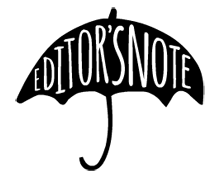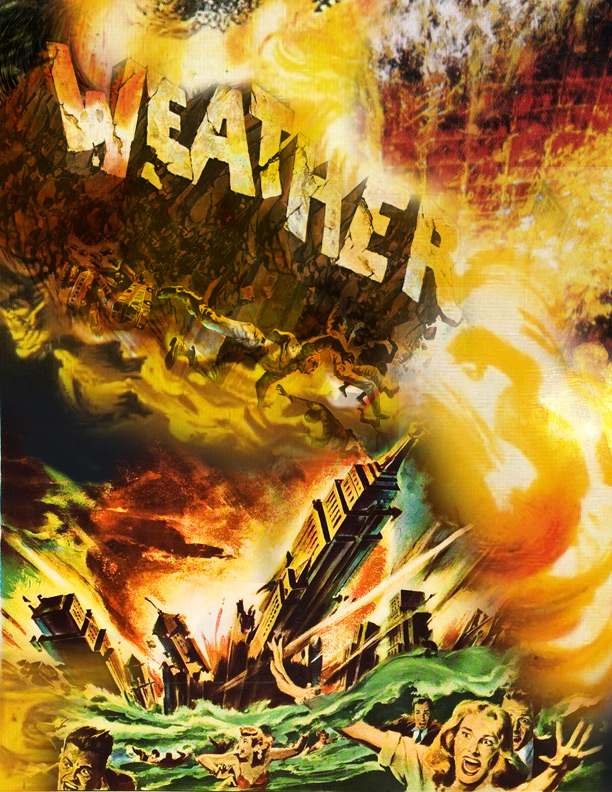This is the editorial note to TNI Vol. 12: Weather. View the full table of contents here.
Subscribe to TNI for $2 and get Weather (and free access to our archive of back issues) today.
***

Everybody talks about the weather —“but nobody ever does anything about it,” jokes Charles Dudley Warner. Everybody talks about it, Ulrike Meinhof repeats, but "we don’t.” The two punch lines both criticize this chatter, but to opposite ends. The two names that get attached to these quotations, an American newspaperman and co-author of The Gilded Age with Mark Twain, and a German journalist and RAF terrorist, represent two divergent responses to the capitalist climate of their time. Warner made a moral critique of the rapacious captains of the Second Industrial Revolution and stopped there. Meinhof left critique behind for violent intervention. But what of their shared horizon? Why bring up talking about the weather in order not to?
We may all do it, but we almost always wish we were talking about something else. Conversation about the weather is supposed to reflect an alienated lack of common subject matter: the awkward dialogue between customer and clerk, the last resort of the lonely party guest. It is for strangers to discuss, and always as a segue into something more serious, more personal. The weather is so contentless as to evade all significant discourse, but then it’s also so universal as to underpin it. Simultaneously too large and too small, the weather laughs as silently at our small talk as when we shout to the heavens.
These days the weather is serious business. Not only because developers are taking over hurricane-devastated neighborhoods, nor due to the advertising millions each weather event promises news networks, nor the billions in federal relief for cities, but because it points to that most serious of eventualities: the coming climate apocalypse.
The first thing any climatologist will tell you is that weather is not the singular of climate, and it’s an annual tradition to laugh at some global warming denier taunting Al Gore while pointing at snow collecting on his DC windowsill. But the laughs have become increasingly bitter. Last year was the hottest on record, and no one 27 or younger has ever lived through a colder than average month. People out west sympathized a little grudgingly with the Eastern Seaboard’s Sandy hysteria after their nearly yearlong drought — the worst drought since 1988, itself the worst since the Dust Bowl years — was largely ignored in the media. While we can’t control the weather — though we affect it — it’s clear that the way we talk about it matters.

In this issue of the New Inquiry, we look at how speaking about complex meteorological systems masks or uncovers equally complex social systems of control. We interview ecocritic Ursula Heise, who highlights how two ancient rhetorical modes, the pastoral and the apocalyptic, still determine how we interpret scientific data about the weather, what these rhetorical modes leave out, and what new modes are developing to talk about our new place in “domesticated nature.” Stephanie Bernhard’s “Climate Changed” forecasts similar modal shifts in literature. Investigating the role that climate has played in recent novels, she places November 2012 in league with Virginia Woolf’s “On or about December, 1910,” as a marker for a periodic change in the literary orientation toward the world, where it will no longer be possible to ignore climate change in day-to-day life.
Gerry Canavan traces the green streak in apocalyptic science fiction in his “Après Nous, Le Deluge," from H. G. Wells's War of the Worlds to Pixar’s Wall-E. He sees in the evolution of millennial sci-fi a complication of the pathetic fallacy by a growing awareness of the Anthropocene. And A. M. Gittlitz and Cosmo Bjorkenheim in “Humid, All Too Humid” question if weather can be the subject of history, and, if not, why the state, capital and eco-activists find it desirable to act like it is.
In “World of Weathercraft,” Jenna Brager and Bailey Kier stay up all night to discover the truth about chemtrails and HAART: that weather control is an all-too-real military obsession. A more benign obsession appears in Amanda Shapiro’s “Not For Prophet,” which traces the disillusionment of hardcore fans of the Weather Channel’s shark-jumping weather-tainment. Weather forecasters play a central, reassuring role in the lives of man, as “modern-day prophets and students of an imperfect science,” but now navigate these from a third position: business-person, tweaking rain predictions for ratings.
Glenn Beck’s new sci-fi novel, Agenda 21, uses one of his favorite strategic ploys: stealing the methods of left-wing populism for right-wing demagoguery. Reviewer Jeff Sparrow pulls apart the contradictions inherent to this practice — and this novel — for us. Robert Kaplan’s attempt to atone for his Iraq war-mongering via geo-political determinism gets taken to task by professional geographer Jason Dittmer, for whom Kaplan’s “fundamental misunderstanding of geography” is the least of his failures.
“Now even talking about the weather has become very political,” cautions Ursula Heise. We agree. As crises mount and the sky above us begins to change, the weather can be a prompt for serious thinking about the limits of our agency — and, perhaps, a terrain for contestation. But first, we need to sort out what it is we’re talking about.

